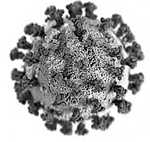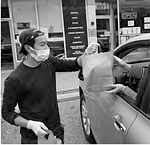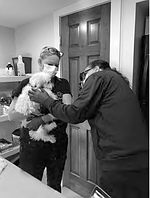Closed Shops, Open Hearts
The coronavirus pandemic impacts us all. One of the hardest hit communities has been among small businesses where the cushion to endure a long-term shut down is thin. Rockland County is no exception. Restaurants have been especially hard hit.
Driving north on Route 9W, you can often see cyclists and bikers congregating (not always practicing social distancing) in the parking lot of the 9W Market, a fixture on the bike route for the past nine years. “We are among the fortunate establishments in town,” said owner Steve Galinas, “because so much of our business is take-out.” Outdoor seating has been outlawed and, of course, the restaurant itself is empty, but all 23 employees are still working, filling catering and to-go orders along with deep cleaning projects. “We have two goals for this time of COVID-19,” Galinas said, “to retain our employees and to continue providing for our guests.” So far, 9W Market has been successful on both counts.
Across town, the Godinez family has operated Zapata’s Mexican Restaurant for sixteen years. Unlike 9W Market, most of Zapata’s income is derived from in-restaurant dining and some wait staff have been laid off. Christian Godinez reported that the kitchen staff is busier than ever since each meal must be individually prepared and wrapped, then delivered to homes or handed out in the parking lot. “It is very stressful” says Christian Godinez. “We are tired—doing deliveries, packing up orders.” Customers have been very supportive, and the Godinez family has assured laid-off workers that they will provide them with food if needed.
Laid off employees hope the Coronavirus Aid, Relief, and Economic Security (CARES) Act or SBA loan programs will help, but skepticism is high. Even securing basic necessities can be daunting. Godinez tells of running out of non-surgical masks and having to spend $5 each for replacements. Looking to the future, May 5 is Cinco de Mayo, a popular festival day and May 15 (the end of Governor Cuomo's NY Pause) looms. “How do we prepare for this?” asks Godinez. “Will people want to come out in public so soon after the lock-down?”
Jack Sitti came to the U.S. twenty years ago with his immigrant parents and grew up knowing first-hand what it means to be food insecure. After working for almost two decades in Thai restaurants (his parents own Thai Garden on Route 303 in Orangeburg), he attended college in upstate New York and lived on a farm for two years, eating what the farm grew and raised. He noticed that fresh produce made him feel better, gave him more energy and was more environmentally sustainable.
Time came for Sitti to start his own restaurant. He combined tasty Thai dishes with healthy, locally grown ingredients. The result is Noodle Hub where the menu is mostly gluten free and features many vegan selections. Operating on a skeletal crew of three to five, Sitti's staff is working hard. He operates a tipless restaurant to show his wait staff that they are essential employees. It is more than a symbolic gesture. "Everyone appreciates having predictable income," he says, and like his counterparts in Zapata’s, he is wary that complicated rules and restrictions in recent government programs will shut out many who apply.
Noodle Hub’s mission statement includes giving back to the community so Sitti has organized weekly deliveries by a network of local restaurants that contribute “shelf stable” food to People To People of Nanuet for distribution to families in need. These times are unique, he says. “Customers are cooped up so they come early for pick-ups to catch a few minutes in the parking lot, but I miss chatting with people over their meal about the intricacies of the dish they’ve chosen and the problem of food insecurity across this nation.”
Restaurants are not the only businesses feeling the pinch. The state has shuttered all construction projects, except in emergencies, a situation that Joe D’Aurio of J&D Backhoe describes as “staggering” for small businesses like his. Bill Bosley, co-founder of LaBozz Design Builders of Nyack, has been doing renovations and restorations in the area since 1986. With seven employees, Bosley has made do by catching up on the maintenance and small repairs to his equipment. “This is a much bigger problem than just today,” Bosley says. “Our goal is to keep everyone whole. New ground rules, like wearing masks, practicing safe distance including only one per truck, were instituted months ago, before there were mandates. Instructions about the precautions were shared in Spanish with our Latino employees. And our customers have been super understanding, empathetic."
Sergio Mata of Sergio Mata Landscaping has been at work in the area for more than a decade. Focusing on yard work, house painting and doing small household repairs, Mata has only two staff, but builds crews as workloads warrant, usually up to six at any given time. Since COVID-19 has struck, Mata and his crews wear masks all the time while on the job, but now all construction has stopped. "Everyone is affected," Mata laments, "It is hard for me. I have to pay everything, but no one is paying me. Since everybody stops, there is not much to do. Customers allow me to do small jobs so everyone has a little bit of income. I'm trying to do whatever I can to help my guys."
Mata also has deep ties to the immigrant community where there is much fear, including fear of getting tested for the virus. He tells of an incident where someone who was symptomatic for COVID-19 needed testing. Without insurance, the tester tried to charge $250. Fearful that his immigration status would be challenged, the person refused and remains untested.
Immigration concerns hang like a cloud over many, a cloud that has only darkened since coronavirus. Workers, many of them immigrants and formerly considered unskilled, are now deemed essential–those who stock our grocery shelves, deliver our medications, clean our houses. Palisades has many in this category although they often live in the shadows. For example, Maria (not her real name) has lived and worked in Rockland County for 25 years cleaning houses. If she doesn’t work, she doesn’t get paid.
She hires a small crew of two others and they take extra precautions, always wearing gloves and a mask and cleaning with extra diligence. Her workload has dropped approximately 75 percent. Many clients are themselves out of work, and she worries whether they will be able to pay her if and when they resume their jobs. People are not comfortable having someone in their home and Maria is uncomfortable as well, knowing how fragile everyone feels at this time. People, however, have been generous. “Some have even paid me without me having to work. They call it ‘vacation pay.’ I am deeply grateful, but I feel guilty because I want to do my work.” She is most concerned for her workers. “Many must choose between rent and groceries. There is no work and they can’t look for work. Everyone is scared.”
House cleaners are among a host of professionals whose work involves entering residences and who have made dramatic changes in their routines. Dr. Laura Murphy, DVM, is a veterinarian from Nyack who has been practicing since 1996. Uniquely, Dr. Murphy makes house calls. As a visiting vet she can only visit in emergencies, and then she sits in the car as the pet owner brings their animal outside. Dr. Murphy then does the examination in the driveway. She uses a different set of gloves, mask and leash for each animal. Her office in Sparkill is still open but she is seeing far fewer patients. Pet owners are also delaying annual or routine visits and animal hospitals are empty so that is no longer a source of income. Yet, she has put billing on hold since those who are stressed financially often don’t have money to pay for vet services.
In response, Dr, Murphy has turned to technology and established an on-line service, Teletails, offering virtual appointments for clients who are not able to bring their pets to the office and allowing pet owners to create profiles both for themselves and their pets.
Bill Paolino is a financial adviser who grew up in Orangetown and has a small practice in Nyack. His work has shifted from face-to-face engagements to telephone and on-line interactions. Because of the volatility in the stock market, his work load has increased. While some of his clients have been aggressive in their holdings (buy low, sell high), others—especially seniors—are scared because of the market’s uncertainty.
If there is the need to record or transfer documents, transactions are handled by his associate Maureen Molloy who works from home and has developed an elaborate system including mailboxes and document drops in her driveway. These days, Paolino rarely sees someone at his office, but he always wears a mask and gloves because there are common spaces in the building. Diligent about disinfecting his equipment and furniture, he quips, “Clorox is the new cologne.”
Antonio Cernuto and Mizar Turdiu have a wholly owned company called PUR2O based in Randolf, New Jersey that installs water purification systems in small offices, schools and residences. Their company, launched in 2006, brings together two concerns—the over-use of plastic and consumption of healthy water—thereby combining green technology with the trend toward personalized health and wellness. Four of their five employees are technicians who have been laid off because there is not enough work. Cernuto and Turdiu are Italian and have family still in Italy. They learned from Italy’s experience with coronavirus and instituted precautions months ago—masks, gloves, spraying and social distancing.
This is normally their heavy season, although now they are only doing emergency calls. They have been dramatically impacted by the current stay-at-home mandate, but they anticipate that once the crisis passes, they will be overwhelmed with backlogged orders, creating a whole different set of problems. They have applied for an Emergency Insurance Disaster Loan, but are uncertain about its efficacy. They do not feel pressure from their customers. As Cernuto says, “Clearly, everyone is understanding.”
A common thread throughout these experiences is an underlying ethos of generosity—from employees towards their staffs, from one staff member to another and from customers to the businesses that enrich the fabric of our society here in Palisades and elsewhere. The shops may be closed, but hearts are overflowing with patience and good will.






